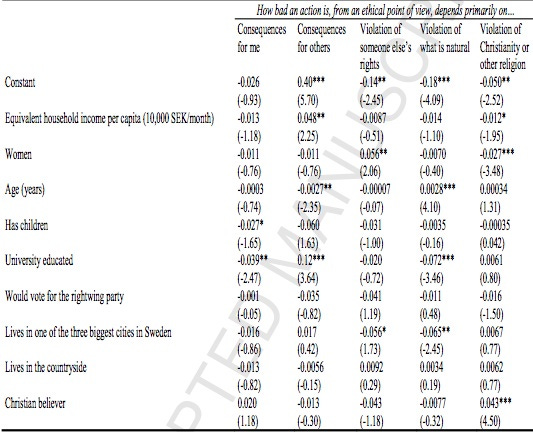Most Are Consequentialist
A new survey suggests that most Swedes think an act’s consequences matter most for whether it is ethical, and the young, rich, well-educated think this even more than most. Men are especially unlikely to think that violating someone’s rights matters. Young, well-educated, and big city folks are especially unlikely to think that it matters what is natural.
The survey:
The survey was mailed to 2,450 randomly selected adults above the age of 18 years in Sweden during the spring of 2004; the overall response rate was 45%.
The main answer distribution:
How bad an action is, from an ethical point of view, depends primarily on:
5.3% How bad the consequences of the action are for myself
62.7% How bad the consequences of the action are for other people and for society 
17.5% The extent to which the action infringes upon someone else’s natural rights
10.6% The extent to which the action violates what is natural
3.7% The extent to which the action violates Christianity according to the New Testament in the Bible
0.3% The extent to which the action violates the rules given by any other religion (such as Islam or Buddhism)
How answers varied with type of person:

Added noon: Bryan is skeptical:
When you pose specific moral questions, Jonathan Haidt and others show that almost no one is remotely close to pure consequentialism.
Yup, as Bryan emphasizes, on abstract political and moral topics where they have a weak personal stake, most people are confused and contradict themselves. Few folks are closely pure anything. So the best we can do is to see their tendencies amid the noise.
Added 5Jan: Bryan points out that I mistakenly added the word “natural” to the rights option. My apologies.


I recognize that timecube style of writing. It seems like Groo forgot to take his haloperidol.
clayton...that the badness/goodness of an action depends upon the total value contained in the consequences....wellcould it be the other way round?
it is not the consequences, but the intentions.Ofcourse we know about the curse of good intentions.
Intentions are (mostly) deductive,Consequences (mostly) are inductive, or retrospective in a sense.Or induce induction, in the sense that we reconstruct a fiction of causalityIt happened because....'Consequences' are factoids, but can only be rightly interpreted by putting them into an endless stream of recursion, i.e. induction-reduction. ...Right?